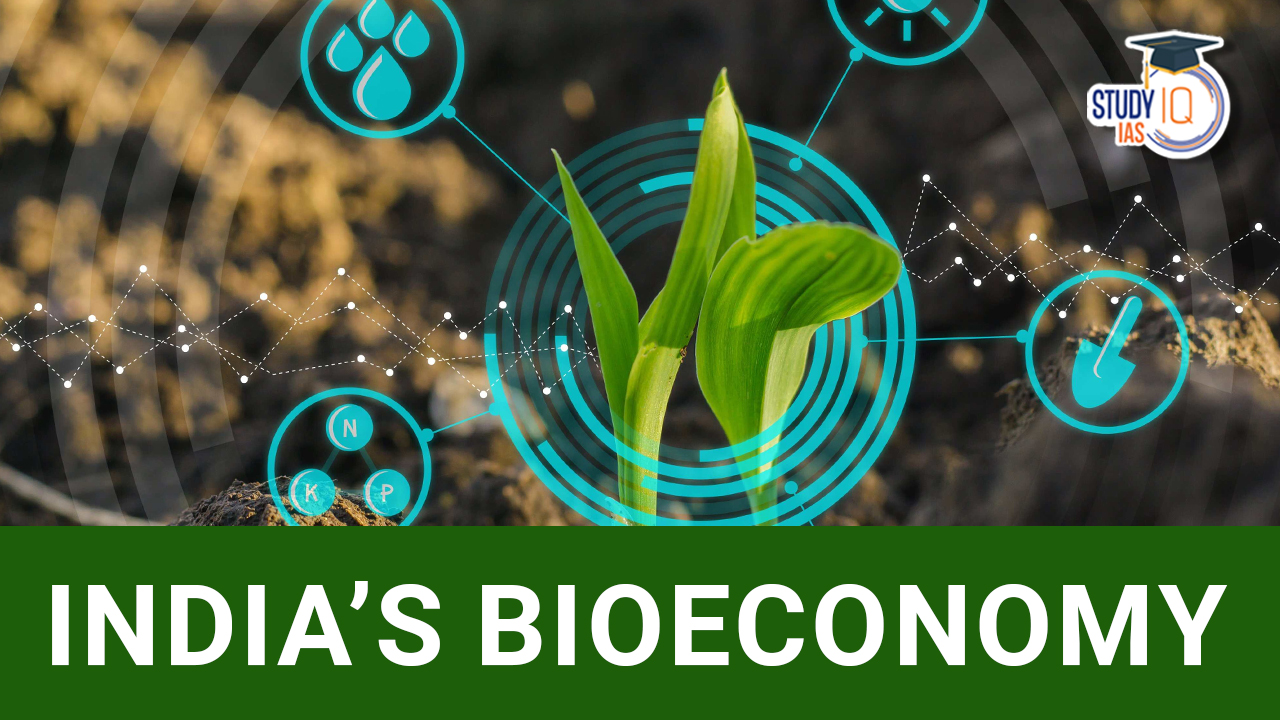Table of Contents
Context: Addressing a conference in New Delhi, the Union Minister Jitendra Singh said India’s bioeconomy jumped from $8 billion in 2014 to $100 billion in 2022 and the country now targets $150 billion by 2025,
What is Bioeconomy?
- The bioeconomy refers to an economic system that uses biological resources and processes to produce goods, services, and energy.
- It involves the sustainable and efficient utilization of renewable biological resources, such as crops, forests, marine life, and microorganisms, to create a wide range of products, from food and feed to biofuels, chemicals, materials, and more.
- UN FAO defines the Bioeconomy as “knowledge-based production and the use of biological resources, processes and methods to provide goods and services in a sustainable manner in all economic sectors”.
Significance of Bioeconomy
- Sustainability and Resource Efficiency: Bioeconomy promotes the use of renewable biological resources and reduces reliance on finite fossil fuels.
- Reduced Environmental Impact: By relying on renewable resources and adopting eco-friendly processes, it contributes to cleaner air, water, and soil, and helps combat climate change.
- Economic Growth and Job Creation: Investments in biotechnology, agriculture, forestry, and related sectors can lead to job opportunities in research, manufacturing, and innovation.
- Rural Development and Agriculture: Biomass production, bioenergy, and value-added agricultural products can provide diversified income sources for farmers and communities.
- Transition to a Circular Bioeconomy: The circular bioeconomy concept envisions a holistic approach that combines the bioeconomy’s sustainable resource use with circular economy principles, leading to a regenerative system that minimizes waste, optimizes resource use, and respects planetary boundaries.
- Global Development and Sustainability Goals: The bioeconomy aligns with various United Nations Sustainable Development Goals, including those related to responsible consumption and production, climate action, life on land and in water, and partnerships for sustainable development.

India’s Bioeconomy
- Biotechnology Industry Research Assistance Council (BIRAC) released India’s Bioeconomy Report 2022. Key highlights of the report include the following:
- India’s bioeconomy has reached over USD 80 billion in 2021, registering a 14.1 percent growth over USD 70.2 billion in 2020.
- It is likely to touch USD 150 billion by 2025 and over USD 300 billion by 2030.
- On average, at least three biotech startups were incorporated every day in 2021 (a total of 1,128 set up in 2021) and the industry crossed USD 1 billion in research and development spending.
- India is among the top 3 in South Asia and top 12 destinations for biotechnology in the world, with approximately 3% share in the global Biotechnology industry.
- India has the second highest number of USFDA (US Food and Drug Administration) approved manufacturing plants outside the US.
Indian initiatives for promoting bioeconomy
- National Policy on Biofuels: The Indian government approved amendments to the National Policy on Biofuels to increase biofuel production.
- This includes plans to introduce ethanol blended petrol with up to a 20% blend starting from April 2023.
- This initiative aims to reduce the dependence on fossil fuels, promote sustainable energy sources, and contribute to a cleaner environment.
- National Biopharma Mission – Innovate India (2017): This initiative, led by the Department of Biotechnology (DBT), is a program worth US$ 250 million.
- It seeks to foster collaboration between industry and academia to promote entrepreneurship and indigenous manufacturing in the biopharmaceutical sector.
- The goal is to enhance the development and production of biopharmaceuticals, which includes products such as vaccines, therapeutic proteins, and diagnostics.
- Bio Incubators: The Indian government has set up 35 bio incubators across the country, equipped with world-class facilities.
- These incubators provide a nurturing environment for startups and entrepreneurs in the biotechnology and bioeconomy sectors.
- They offer support, resources, and infrastructure to help early-stage companies develop and scale their innovative ideas.
- Bio-clusters: The Indian government supports four bio-clusters located in different regions – NCR (National Capital Region), Kalyani, Bangalore, and Pune.
- These bio-clusters aim to create an ecosystem that fosters innovation, research, and entrepreneurship in the bioeconomy sector.
- National Mission on Bioeconomy: Launched in 2016 by the Institute of Bio-resources and Sustainable Development under the Ministry of Science and Technology, this mission is focused on boosting the rural economy by leveraging bio-resources.
- It aims to promote sustainable and inclusive development by harnessing the potential of biological resources for various applications, including agriculture, healthcare, and more.


 Phone-tapping in India, Legal Framework ...
Phone-tapping in India, Legal Framework ...
 Bihar Assembly Election 2025 Dates, Poli...
Bihar Assembly Election 2025 Dates, Poli...
 Jharkhand High Court Assistants Admit Ca...
Jharkhand High Court Assistants Admit Ca...





















